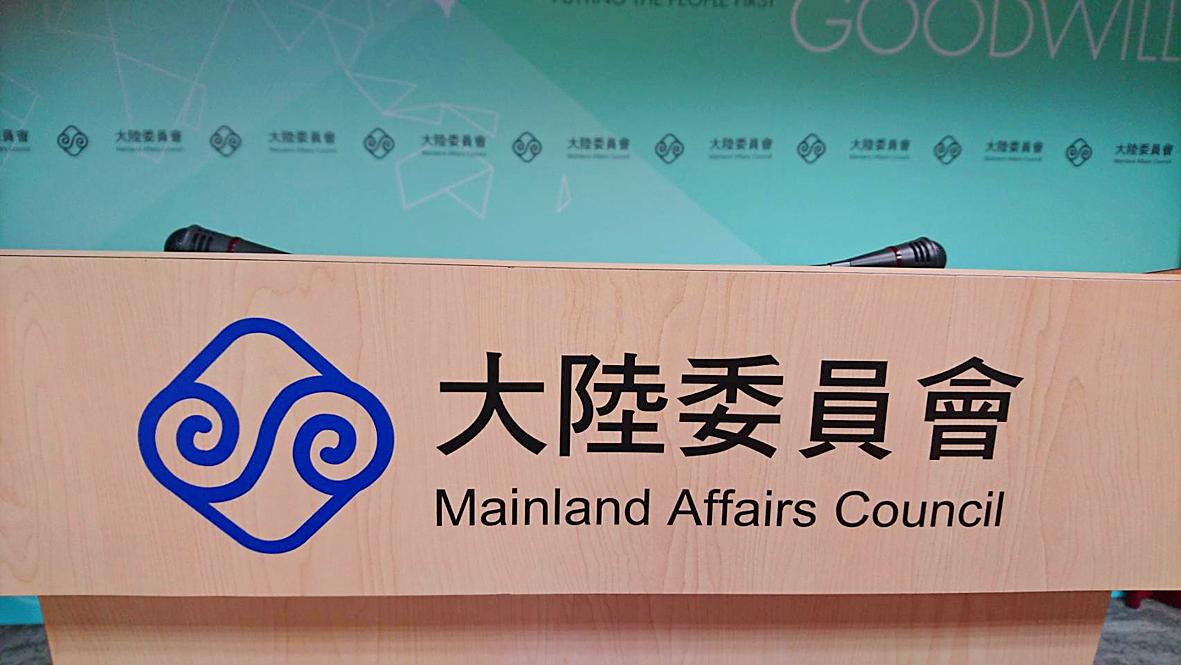China’s “united front” efforts targeting Taiwan are ubiquitous, and include the employment of Internet celebrities to carry out infiltration campaigns on social media, members of the Mainland Affairs Council’s (MAC) Advisory Committee said yesterday.
The council released the minutes of a committee meeting on China’s “legal war” against Taiwan and possible response measures.
The “legal war” aims to unilaterally define jurisdiction over Taiwan to legitimize annexing the nation based on Beijing’s so-called “democratic negotiations,” while preparing to negate Taiwanese legislation, the minutes said.

Photo: Chung Li-hua, Taipei Times
Committee members and academics who attended the meeting were not named in the minutes.
The National Security Law imposed by Beijing in Hong Kong is a model for China to draw up Taiwan-related regulations, the minutes said.
Globally, Beijing would continue to squeeze Taiwan’s international space and block the nation from joining international organizations as a sovereign state, they said.
On a civic level, Beijing aims to promote economic, social and cultural integration by linking identity documents for Taiwanese to China’s civic rights, it said.
To grasp the changes in China’s legislation related to Taiwan, the government should watch the implementation of Hong Kong’s National Security Law and the developments in the territory, the minutes said.
China’s legal war against Taiwan operates in tandem with other public opinion, psychological and diplomatic tactics, a committee member said.
Beijing has been employing Internet celebrities to wage “united front” and infiltration campaigns against Taiwan on video platforms or attack certain targets through social media, such as WeChat, in an attempt to circumvent legal regulations, the member said.
Taiwan should prepare countermeasures and share information with international partners to promote joint defense and security cooperation, the member added.
China’s legal war against Taiwan is ubiquitous, another committee member said, citing as examples Chinese People’s Liberation Army aircraft continuing to harass Taiwan and Beijing publicly denying the existence of the median line of the Taiwan Strait.
By rejecting the median line, Beijing is extending its dominion over Taiwan and unilaterally changing the cross-strait “status quo,” just as it enacted the National Security Law in Hong Kong and changed the territory’s “one country, two systems” framework, they said.
In addition to downgrading Taiwan’s international status, Beijing also purports to represent the nation’s interests in international disputes, as shown by its response to the arbitration of territorial disputes in the South China Sea, they said, adding that Taiwan should more actively express its objection to Beijing’s maneuvers.
Another committee member said that China has never abided by the rule of law, but only uses laws to achieve its political aims.
Beijing’s regulations about actual and claimed dominions are different, evidenced by the varied strength and flexibility of its National Security Law enacted in Hong Kong and its “Anti-Secession” Law targeting Taiwan, which deserves the nation’s unwavering attention, they said.

Intelligence agents have recorded 510,000 instances of “controversial information” being spread online by the Chinese Communist Party (CCP) so far this year, the National Security Bureau (NSB) said in a report yesterday, as it warned of artificial intelligence (AI) being employed to generate destabilizing misinformation. The bureau submitted a written report to the Legislative Yuan in preparation for National Security Bureau Director-General Tsai Ming-yen’s (蔡明彥) appearance before the Foreign Affairs and National Defense Committee today. The CCP has been using cognitive warfare to divide Taiwanese society by commenting on controversial issues such as Taiwan Semiconductor Manufacturing Co’s (TSMC, 台積電) investments in the

INVESTIGATION: The case is the latest instance of a DPP figure being implicated in an espionage network accused of allegedly leaking information to Chinese intelligence Democratic Progressive Party (DPP) member Ho Jen-chieh (何仁傑) was detained and held incommunicado yesterday on suspicion of spying for China during his tenure as assistant to then-minister of foreign affairs Joseph Wu (吳釗燮). The Taipei District Prosecutors’ Office said Ho was implicated during its investigation into alleged spying activities by former Presidential Office consultant Wu Shang-yu (吳尚雨). Prosecutors said there is reason to believe Ho breached the National Security Act (國家安全法) by leaking classified Ministry of Foreign Affairs information to Chinese intelligence. Following interrogation, prosecutors petitioned the Taipei District Court to detain Ho, citing concerns over potential collusion or tampering of evidence. The

‘COMPREHENSIVE PLAN’: Lin Chia-lung said that the government was ready to talk about a variety of issues, including investment in and purchases from the US The National Stabilization Fund (NSF) yesterday announced that it would step in to staunch stock market losses for the ninth time in the nation’s history. An NSF board meeting, originally scheduled for Monday next week, was moved to yesterday after stocks plummeted in the wake of US President Donald Trump’s announcement of 32 percent tariffs on Taiwan on Wednesday last week. Board members voted to support the stock market with the NT$500 billion (US$15.15 billion) fund, with injections of funds to begin as soon as today. The NSF in 2000 injected NT$120 billion to stabilize stocks, the most ever. The lowest amount it

NEGOTIATIONS: Taiwan has good relations with Washington and the outlook for the negotiations looks promising, Minister of Economic Affairs J.W. Kuo said Taiwan’s GDP growth this year is expected to decrease by 0.43 to 1.61 percentage points due to the effects of US tariffs, National Development Council (NDC) Minister Paul Liu (劉鏡清) said at a meeting of the legislature’s Economics Committee in Taipei yesterday, citing a preliminary estimate by a private research institution. Taiwan’s economy would be significantly affected by the 32 percent “reciprocal” tariffs slapped by the US, which took effect yesterday, Liu said, adding that GDP growth could fall below 3 percent and potentially even dip below 2 percent to 1.53 percent this year. The council has commissioned another institution